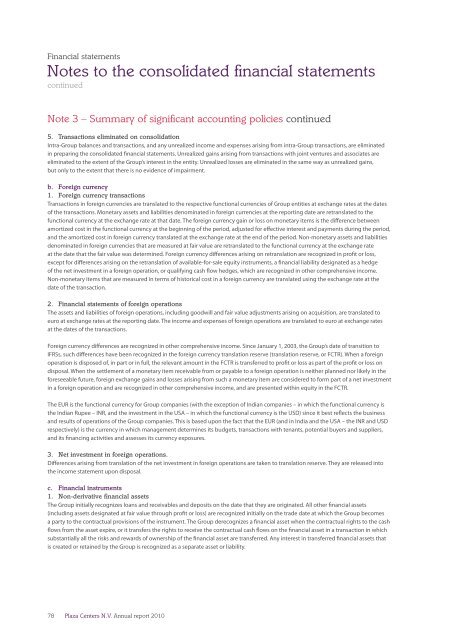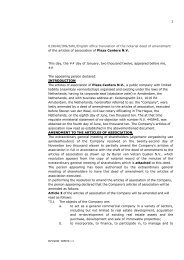Annual report 2010 - plazacenters
Annual report 2010 - plazacenters
Annual report 2010 - plazacenters
Create successful ePaper yourself
Turn your PDF publications into a flip-book with our unique Google optimized e-Paper software.
Financial statements<br />
Notes to the consolidated financial statements<br />
continued<br />
Note 3 – Summary of significant accounting policies continued<br />
5. Transactions eliminated on consolidation<br />
Intra-Group balances and transactions, and any unrealized income and expenses arising from intra-Group transactions, are eliminated<br />
in preparing the consolidated financial statements. Unrealized gains arising from transactions with joint ventures and associates are<br />
eliminated to the extent of the Group’s interest in the entity. Unrealized losses are eliminated in the same way as unrealized gains,<br />
but only to the extent that there is no evidence of impairment.<br />
b. Foreign currency<br />
1. Foreign currency transactions<br />
Transactions in foreign currencies are translated to the respective functional currencies of Group entities at exchange rates at the dates<br />
of the transactions. Monetary assets and liabilities denominated in foreign currencies at the <strong>report</strong>ing date are retranslated to the<br />
functional currency at the exchange rate at that date. The foreign currency gain or loss on monetary items is the difference between<br />
amortized cost in the functional currency at the beginning of the period, adjusted for effective interest and payments during the period,<br />
and the amortized cost in foreign currency translated at the exchange rate at the end of the period. Non-monetary assets and liabilities<br />
denominated in foreign currencies that are measured at fair value are retranslated to the functional currency at the exchange rate<br />
at the date that the fair value was determined. Foreign currency differences arising on retranslation are recognized in profit or loss,<br />
except for differences arising on the retranslation of available-for-sale equity instruments, a financial liability designated as a hedge<br />
of the net investment in a foreign operation, or qualifying cash flow hedges, which are recognized in other comprehensive income.<br />
Non-monetary items that are measured in terms of historical cost in a foreign currency are translated using the exchange rate at the<br />
date of the transaction.<br />
2. Financial statements of foreign operations<br />
The assets and liabilities of foreign operations, including goodwill and fair value adjustments arising on acquisition, are translated to<br />
euro at exchange rates at the <strong>report</strong>ing date. The income and expenses of foreign operations are translated to euro at exchange rates<br />
at the dates of the transactions.<br />
Foreign currency differences are recognized in other comprehensive income. Since January 1, 2003, the Group’s date of transition to<br />
IFRSs, such differences have been recognized in the foreign currency translation reserve (translation reserve, or FCTR). When a foreign<br />
operation is disposed of, in part or in full, the relevant amount in the FCTR is transferred to profit or loss as part of the profit or loss on<br />
disposal. When the settlement of a monetary item receivable from or payable to a foreign operation is neither planned nor likely in the<br />
foreseeable future, foreign exchange gains and losses arising from such a monetary item are considered to form part of a net investment<br />
in a foreign operation and are recognized in other comprehensive income, and are presented within equity in the FCTR.<br />
The EUR is the functional currency for Group companies (with the exception of Indian companies – in which the functional currency is<br />
the Indian Rupee – INR, and the investment in the USA – in which the functional currency is the USD) since it best reflects the business<br />
and results of operations of the Group companies. This is based upon the fact that the EUR (and in India and the USA – the INR and USD<br />
respectively) is the currency in which management determines its budgets, transactions with tenants, potential buyers and suppliers,<br />
and its financing activities and assesses its currency exposures.<br />
3. Net investment in foreign operations.<br />
Differences arising from translation of the net investment in foreign operations are taken to translation reserve. They are released into<br />
the income statement upon disposal.<br />
c. Financial instruments<br />
1. Non-derivative financial assets<br />
The Group initially recognizes loans and receivables and deposits on the date that they are originated. All other financial assets<br />
(including assets designated at fair value through profit or loss) are recognized initially on the trade date at which the Group becomes<br />
a party to the contractual provisions of the instrument. The Group derecognizes a financial asset when the contractual rights to the cash<br />
flows from the asset expire, or it transfers the rights to receive the contractual cash flows on the financial asset in a transaction in which<br />
substantially all the risks and rewards of ownership of the financial asset are transferred. Any interest in transferred financial assets that<br />
is created or retained by the Group is recognized as a separate asset or liability.<br />
78<br />
Plaza Centers N.V. <strong>Annual</strong> <strong>report</strong> <strong>2010</strong>








